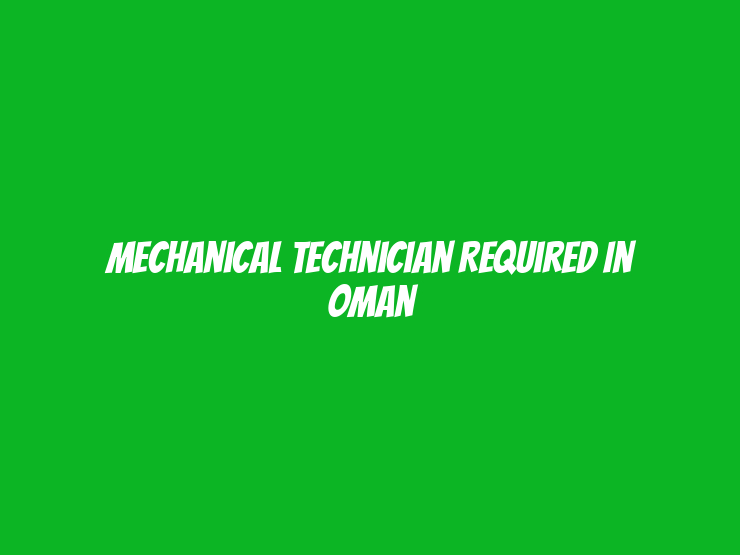A Mechanical Technician is responsible for maintaining, repairing, and installing mechanical systems and equipment in a variety of industries, including manufacturing, construction, and energy. They ensure that machines and mechanical systems are operating efficiently and safely. Mechanical Technicians work with tools, machinery, and various mechanical devices, performing routine maintenance, troubleshooting issues, and implementing solutions to avoid downtime and ensure smooth operations. This role requires technical expertise, attention to detail, and the ability to work under pressure to meet deadlines and resolve mechanical issues promptly.
Dua for Job Seeking: اللهم يسر ولا تعسر واكمل ولا تكل وبارك لي فيما قَدَّرت
| Salary | Market Competitive |
| Experience | 3 – 6 years |
| Location | Oman |
| Qualification | Any Graduation |
| Posted | 6 November 2024 |
| Job Type | Full-Time |
| Posted by | Habeebi Recruiter |
| last date to apply | apply within 15 days of posting |
Key Responsibilities of a Mechanical Technician
1. Installation and Assembly of Mechanical Systems
Mechanical Technicians are responsible for installing and assembling mechanical systems and equipment, including motors, pumps, compressors, and HVAC systems. They follow blueprints, schematics, and manufacturer instructions to ensure that the systems are installed correctly and meet operational standards. During installation, they check for proper alignment, calibration, and overall function, ensuring that all components work together effectively to achieve optimal performance.
2. Maintenance and Preventive Care
A significant part of a Mechanical Technician’s role involves routine maintenance and preventive care to ensure that mechanical equipment runs smoothly and efficiently. This includes inspecting equipment, lubricating parts, adjusting components, and replacing worn or damaged parts. By conducting regular maintenance, they help extend the lifespan of machinery and prevent costly breakdowns. Preventive care is crucial for reducing downtime and maintaining productivity in any mechanical environment.
3. Troubleshooting and Repairing Mechanical Issues
When mechanical issues arise, Mechanical Technicians are tasked with troubleshooting and diagnosing problems. They use various tools, diagnostic equipment, and technical knowledge to identify the root cause of the malfunction. After diagnosing the issue, they make necessary repairs, which may involve replacing parts, adjusting settings, or recalibrating equipment to restore its functionality. Speed and accuracy in troubleshooting are vital to minimize downtime and maintain operations.
4. Conducting Inspections and Testing
Mechanical Technicians perform routine inspections of mechanical equipment to ensure that all components are functioning properly and safely. They test equipment using specialized instruments to measure factors such as pressure, temperature, and alignment. Based on the results of these tests, they make recommendations for repairs, upgrades, or adjustments to ensure optimal performance. Inspections are also crucial for ensuring compliance with safety standards and regulations.
5. Documenting and Reporting
Mechanical Technicians are responsible for documenting the work they perform, including maintenance activities, repairs, inspections, and any issues encountered. They maintain detailed records of all activities, which are often required for compliance with industry regulations or company policies. These records help track the performance and history of mechanical systems, and they provide valuable data for future maintenance planning and inventory management.
6. Collaborating with Other Teams
Mechanical Technicians often collaborate with other departments, such as engineering, operations, and quality control, to ensure that mechanical systems meet the required specifications and standards. They work together to address any technical challenges, implement improvements, or resolve issues that impact production or efficiency. Effective communication with team members helps maintain a smooth workflow and ensures that projects are completed on time.
7. Ensuring Safety and Compliance
Safety is a primary responsibility for Mechanical Technicians. They follow strict safety protocols and guidelines to protect themselves and others while working with heavy machinery and potentially hazardous materials. This includes wearing the appropriate personal protective equipment (PPE), following lockout/tagout procedures, and ensuring that equipment is operated safely. Additionally, Mechanical Technicians ensure compliance with local and industry-specific regulations related to mechanical systems and equipment.
Skills and Qualifications
Mechanical Technicians should possess a strong understanding of mechanical systems and equipment, as well as the ability to work with various tools and diagnostic instruments. A technical degree in mechanical engineering technology, industrial maintenance, or a related field is typically required, along with relevant certifications or licenses. Practical experience in mechanical troubleshooting, repair, and installation is essential, as well as the ability to read and interpret technical diagrams and manuals. Mechanical Technicians should also have strong problem-solving skills, attention to detail, and the ability to work independently or as part of a team. Physical stamina and the ability to work in a fast-paced, often physically demanding environment are also important for success in this role.
How to apply:
Send your updated resume to our email or directly reach us at our phone:
Email: muthukumar@shiyali.in, thilagavathi@shiyali.in
Phone: 0091-4424460077/35002615
Disclaimer:
- We list jobs submitted by employers. HabeebiRecruiter.com does not verify employers or guarantee job details.
- Be aware: legitimate jobs never require upfront payment
